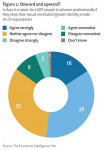Previous leaders lose ground in the Economist Intelligence Unit’s 2008 e-readiness rankings
Maintaining the momentum of digital development is clearly quite tough. The aforementioned European ICT leaders have been unable, in some areas, to sustain the heady pace of development they had previously established. Both Finland and Denmark, for instance, were unable to maintain previous ICT spending levels or to improve upon (albeit impressive) public and corporate access to digital channels. By contrast, those countries that have advanced in the top 10·the US, Hong Kong, the Netherlands and Australia·have largely done so on the back of improvements in connectivity·both in fixed and wireless broadband access, as well as in their innovation environments.
“The world’s most developed digital economies·and many less developed ones·continue to record impressive gains in broadening access to ICT and making digital services available to the population,” says Robin Bew, Editorial Director of the Economist Intelligence Unit. “It is hard work to maintain this progress, however, and even the leaders have much to do to translate these gains into real economic and social benefits".
The gap between the "haves" and "have-nots" in our rankings narrowed again in 2008, a hopeful indication of a contraction in the digital divide between developed and developing countries. However, the narrowing of this gap was considerably less than in previous years. The least e-ready countries have registered no upward movement in their rankings (although most have improved their scores), partly because their business environments have deteriorated or improved only slightly. Connectivity improvements in some developing countries, particularly in Latin America, are also alarmingly slow. Other lower ranked countries, however, such as Saudi Arabia, Thailand and Egypt, have moved upwards thanks mainly to faster progress in connectivity.
"In our research we have identified three tiers of countries within the e-readiness rankings: established leaders, rapid adopters and late entrants," says Peter Korsten, Global Leader of the IBM Institute for Business Value. "These groups have remained relatively constant, but the most impressive improvements have been registered by the 'late entrants', as exemplified by countries such as Thailand, Peru, and Romania, which have risen in the rankings by up to 17 places between 2001 and 2008."
Since 2000, the Economist Intelligence Unit has published an annual e-readiness ranking of the world’s largest economies, using a model developed in co-operation with the IBM Institute for Business Value. A country’s “e-readiness” is a measure of its e-business environment, a collection of factors that indicate how amenable a market is to Internet-based opportunities. Increasingly, it is also about how individuals and businesses consume digital goods and services.
Our analysis in 2008 identifies several guiding principles that policymakers can use to evaluate the opportunities for advancing e-readiness in their countries:
· Let the market build it... Competitive telecoms and Internet service markets are more efficient than governments in building networks and finding affordable price points for consumers. Policymakers should allow market forces to determine the course of the digital economy, and must resist the urge to steer its ICT industry into technology-specific directions.
· … But step in when needed. Governments must, at the same time, ensure that investment finds its way to society's digital "have-nots"; rural and poor communities, for example, tend to be left behind if service providers follow a purely market-driven course.
· Lead by example. In poorer countries, governments should strive to be an early adopter of digital practices that other organisations and individuals can emulate. They can also create demand for technology and digitally enabled services, both through their own direct purchases and through the creation of additional channels for procurement, tax filing and other operations.
· Don’t do it all. Governments must champion digital development, fund their own ICT infrastructure, regulate lightly and encourage others to adopt·a complex juggling act. But they must also be as unobtrusive as possible if digital business is to thrive. For one thing, they should remain staunchly technology-neutral in their procurement and licensing practices.
· Keep at it. As this year’s rankings show, it is precariously easy to fall back on more strategic digital objectives, and thus lose some of the ground gained in building networks and communities. The world of e-readiness is a place with ever-shifting targets, where policy and practices must be reviewed and refreshed frequently in order to meet the aspirations of the communities that governments serve.
웹사이트: http://www.eiu.com
연락처
Joanne McKenna: +44 (0)20 7576 8188 or 이메일 보내기
이 보도자료는 Economist Intelligence Unit가(이) 작성해 뉴스와이어 서비스를 통해 배포한 뉴스입니다.




